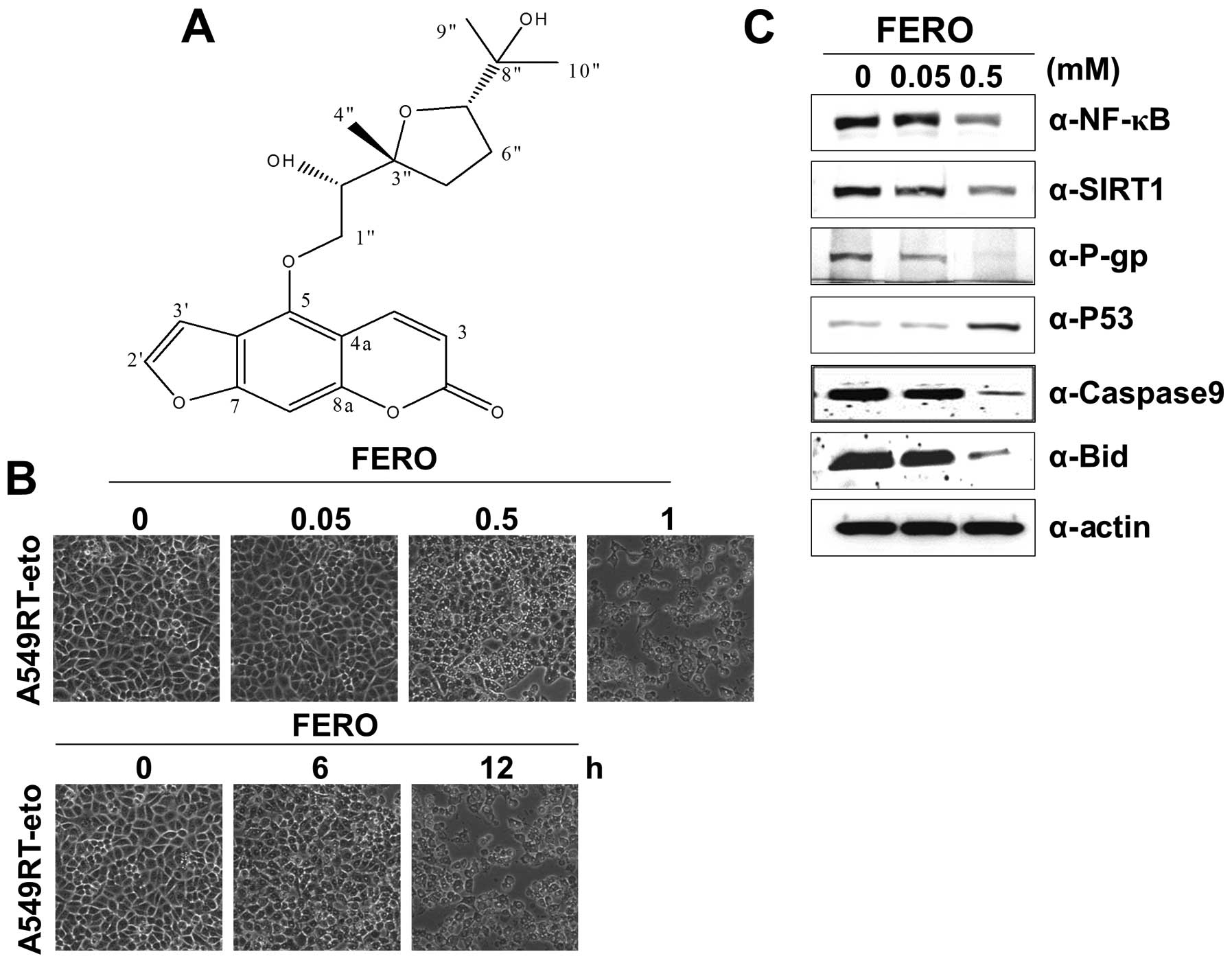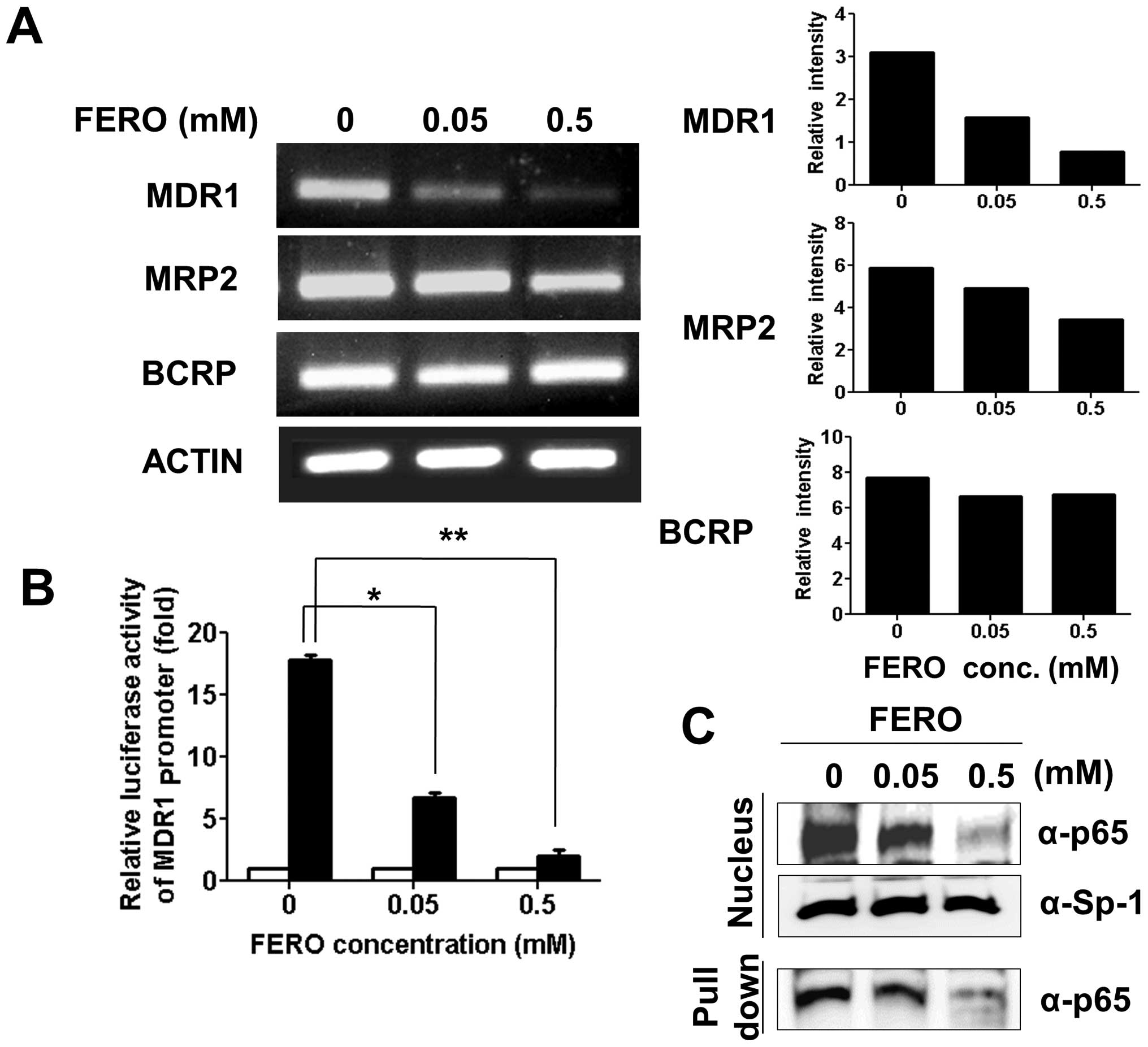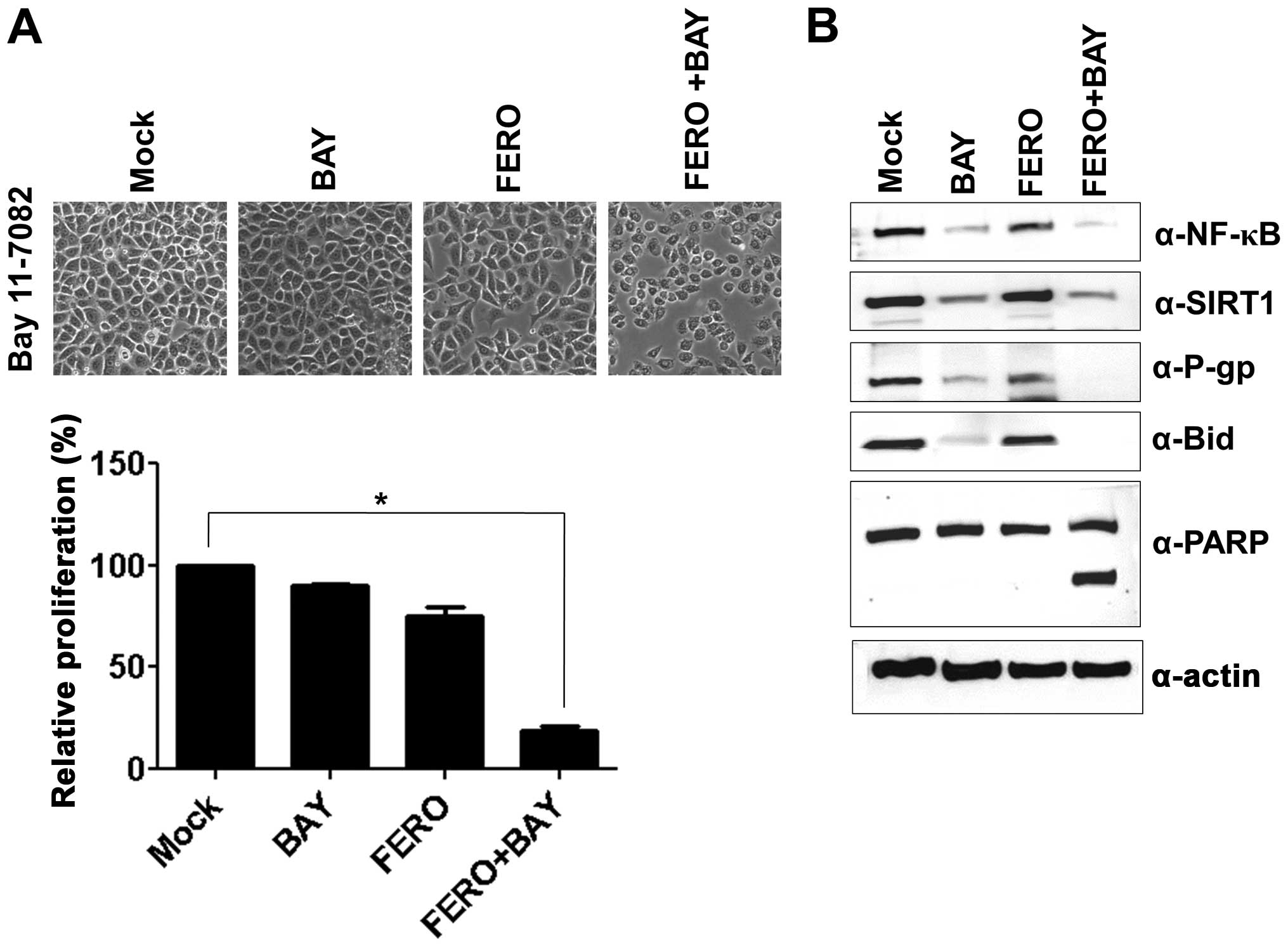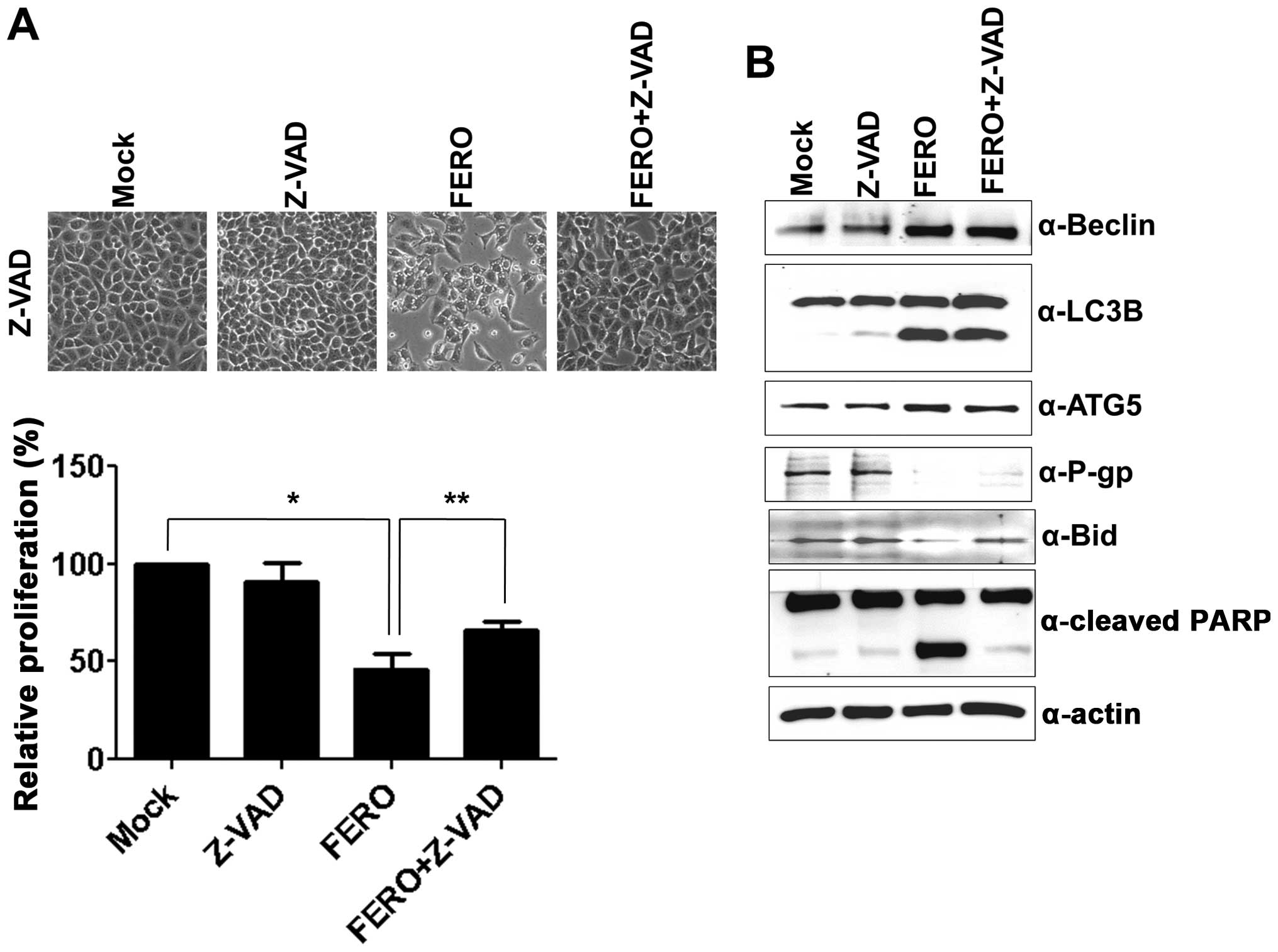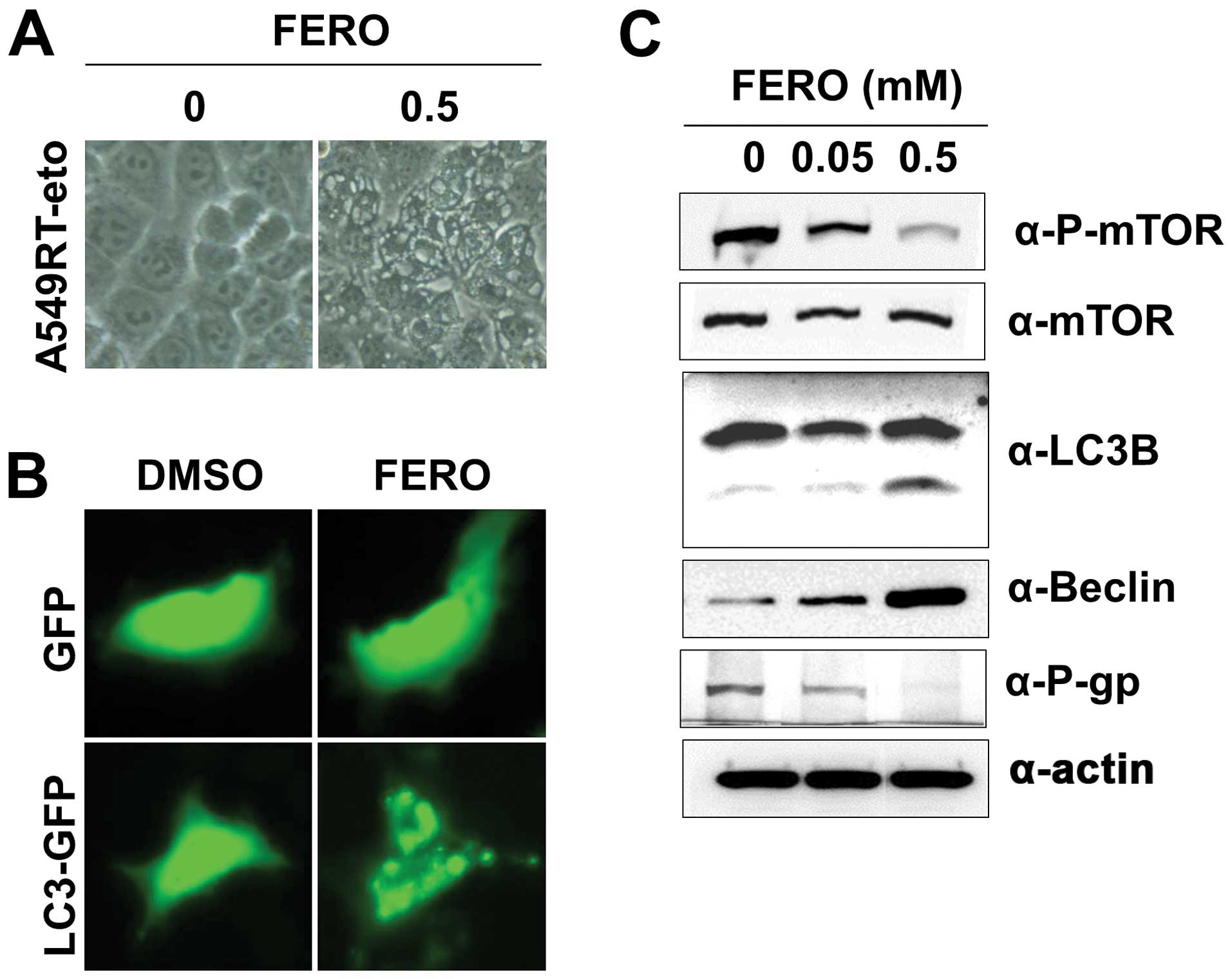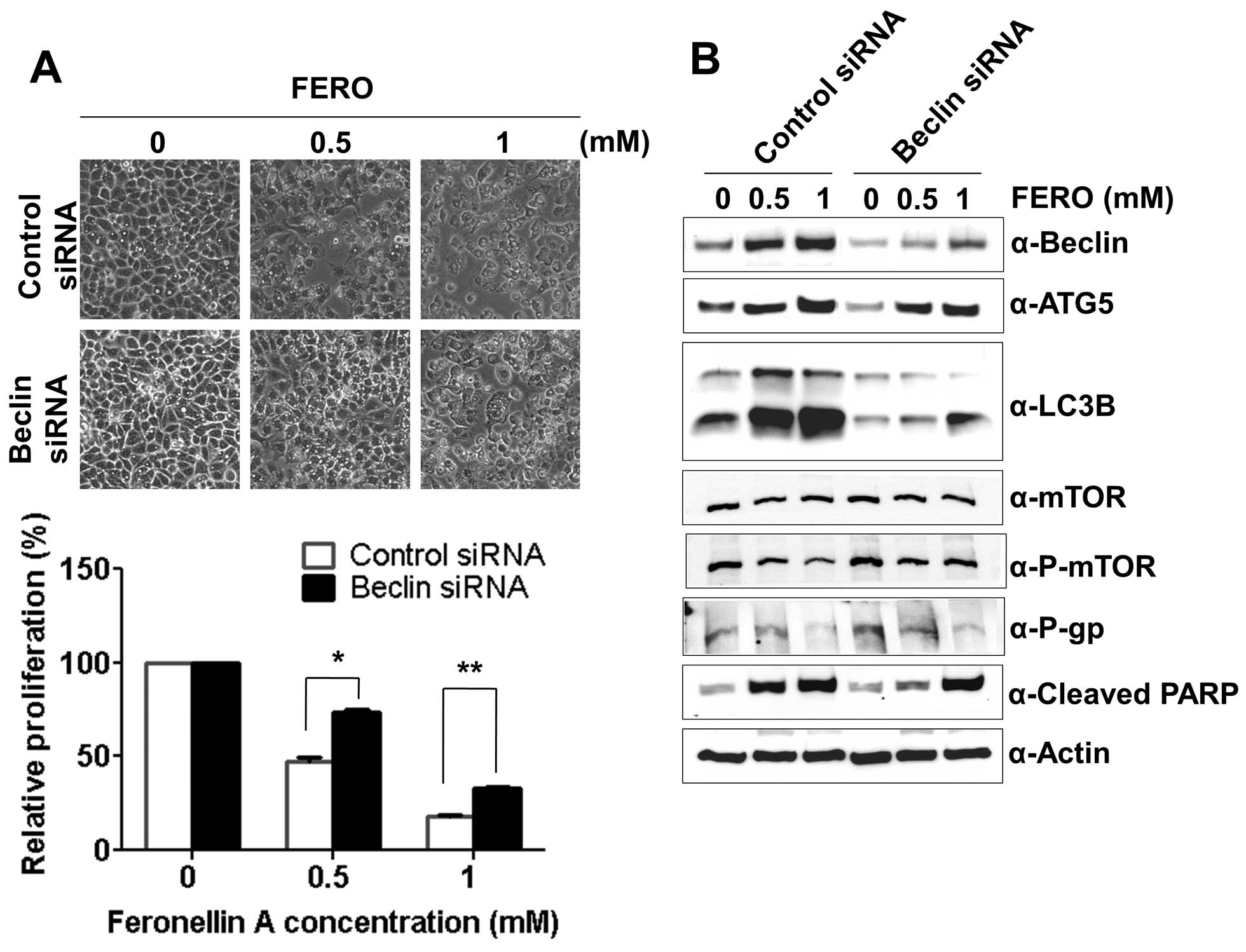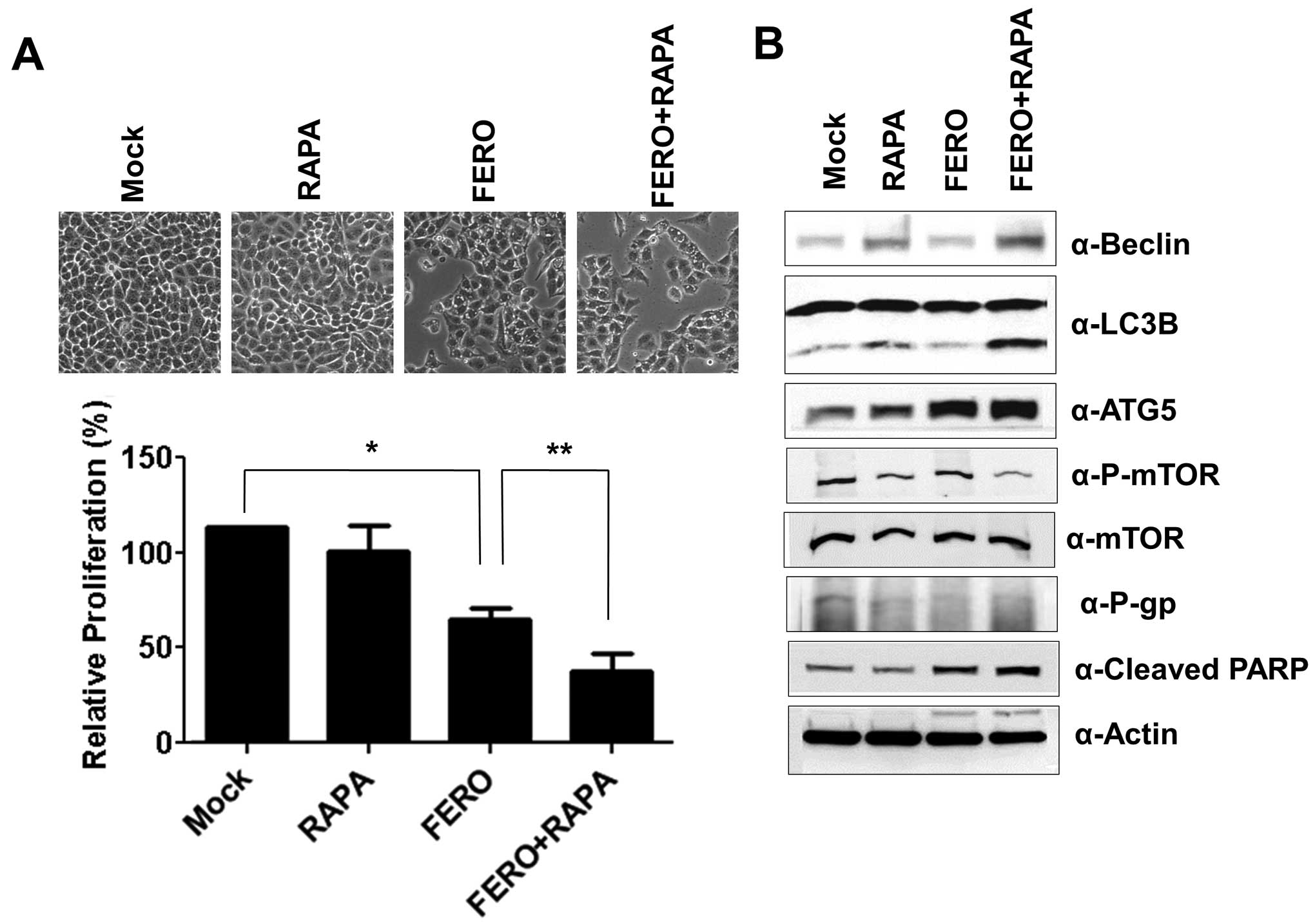|
1.
|
Tan G, Gyllenhaal C and Soejarto DD:
Biodiversity as a source of anticancer drugs. Curr Drug Targets.
7:265–277. 2006.PubMed/NCBI
|
|
2.
|
Bronikowska J, Szliszka E, Jaworska D,
Czuba ZP and Krol W: The coumarin psoralidin enhances anticancer
effect of tumor necrosis factor-related apoptosis-inducing ligand
(TRAIL). Molecules. 17:6449–6464. 2012. View Article : Google Scholar
|
|
3.
|
Diwan R and Malpathak N: Furanocoumarins:
novel topoisom-erase I inhibitors from Ruta graveolens L.
Bioorg Med Chem. 17:7052–7055. 2009. View Article : Google Scholar : PubMed/NCBI
|
|
4.
|
Ohnishi A, Matsuo H, Yamada S, et al:
Effect of furanocoumarin derivatives in grapefruit juice on the
uptake of vinblastine by Caco-2 cells and on the activity of
cytochrome P450 3A4. Br J Pharmacol. 130:1369–1377. 2000.
View Article : Google Scholar : PubMed/NCBI
|
|
5.
|
Paine MF, Widmer WW, Hart HL, et al: A
furanocoumarin-free grapefruit juice establishes furanocoumarins as
the mediators of the grapefruit juice-felodipine interaction. Am J
Clin Nutr. 83:1097–1105. 2006.PubMed/NCBI
|
|
6.
|
Biedler JL: Drug resistance: genotype
versus phenotype - Thirty-second G.H.A. Clowes Memorial Award
Lecture. Cancer Res. 54:666–678. 1994.PubMed/NCBI
|
|
7.
|
Bosch I and Croop J: P-glycoprotein
multidrug resistance and cancer. Biochim Biophys Acta. 9:37–54.
1996.
|
|
8.
|
Goldstein LJ, Galski H, Fojo A, et al:
Expression of a multidrug resistance gene in human cancers. J Natl
Cancer Inst. 81:116–124. 1989. View Article : Google Scholar : PubMed/NCBI
|
|
9.
|
Gottesman MM, Fojo T and Bates SE:
Multidrug resistance in cancer: role of ATP-dependent transporters.
Nat Rev Cancer. 2:48–58. 2002. View
Article : Google Scholar : PubMed/NCBI
|
|
10.
|
Friedrich K, Wieder T, Von Haefen C, et
al: Overexpression of caspase-3 restores sensitivity for
drug-induced apoptosis in breast cancer cell lines with acquired
drug resistance. Oncogene. 20:2749–2760. 2001. View Article : Google Scholar
|
|
11.
|
Ruefli AA, Tainton KM, Darcy PK, Smyth MJ
and Johnstone RW: P-glycoprotein inhibits caspase-8 activation but
not formation of the death inducing signal complex (disc) following
Fas ligation. Cell Death Differ. 9:1266–1272. 2002. View Article : Google Scholar : PubMed/NCBI
|
|
12.
|
Bentires-Alj M, Barbu V, Fillet M, et al:
NF-kappaB transcription factor induces drug resistance through
MDR1 expression in cancer cells. Oncogene. 22:90–97. 2003.
View Article : Google Scholar : PubMed/NCBI
|
|
13.
|
Chu F, Chou PM, Zheng X, Mirkin BL and
Rebbaa A: Control of multidrug resistance gene mdr1 and cancer
resistance to chemotherapy by the longevity gene sirt1. Cancer Res.
65:10183–10187. 2005. View Article : Google Scholar : PubMed/NCBI
|
|
14.
|
Klionsky DJ and Emr SD: Autophagy as a
regulated pathway of cellular degradation. Science. 290:1717–1721.
2000. View Article : Google Scholar : PubMed/NCBI
|
|
15.
|
Levine B and Klionsky DJ: Development by
self-digestion: molecular mechanisms and biological functions of
autophagy. Dev Cell. 6:463–477. 2004. View Article : Google Scholar : PubMed/NCBI
|
|
16.
|
Levine B and Kroemer G: Autophagy in the
pathogenesis of disease. Cell. 132:27–42. 2008. View Article : Google Scholar : PubMed/NCBI
|
|
17.
|
Qu X, Yu J, Bhagat G, et al: Promotion of
tumorigenesis by heterozygous disruption of the beclin 1 autophagy
gene. J Clin Invest. 112:1809–1820. 2003. View Article : Google Scholar : PubMed/NCBI
|
|
18.
|
Levine B: Cell biology: autophagy and
cancer. Nature. 446:745–747. 2007. View
Article : Google Scholar : PubMed/NCBI
|
|
19.
|
Takamura A, Komatsu M, Hara T, et al:
Autophagy-deficient mice develop multiple liver tumors. Genes Dev.
25:795–800. 2011. View Article : Google Scholar : PubMed/NCBI
|
|
20.
|
Han J, Hou W, Goldstein LA, et al:
Involvement of protective autophagy in TRAIL resistance of
apoptosis-defective tumor cells. J Biol Chem. 283:19665–19677.
2008. View Article : Google Scholar
|
|
21.
|
Katayama M, Kawaguchi T, Berger MS and
Pieper RO: DNA damaging agent-induced autophagy produces a
cytoprotective adenosine triphosphate surge in malignant glioma
cells. Cell Death Differ. 14:548–558. 2007. View Article : Google Scholar
|
|
22.
|
Li X and Fan Z: The epidermal growth
factor receptor antibody cetuximab induces autophagy in cancer
cells by downregulating HIF-1alpha and Bcl-2 and activating the
beclin 1/hVps34 complex. Cancer Res. 70:5942–5952. 2010. View Article : Google Scholar : PubMed/NCBI
|
|
23.
|
Ogata M, Hino S, Saito A, et al: Autophagy
is activated for cell survival after endoplasmic reticulum stress.
Mol Cell Biol. 26:9220–9231. 2006. View Article : Google Scholar : PubMed/NCBI
|
|
24.
|
Kanintronkul Y, Worayuthakarn R, Thasana
N, et al: Overcoming multidrug resistance in human lung cancer with
novel benzo[α] quinolizin-4-ones. Anticancer Res. 31:921–927.
2011.PubMed/NCBI
|
|
25.
|
Phuwapraisirisan P, Surapinit S, Sombund
S, Siripong P and Tip-pyang S: Feroniellins A–C, novel cytotoxic
furanocoumarins with highly oxygenated C10 moieties from
Feroniella lucida. Tetrahedron Lett. 47:3685–3688. 2006.
|
|
26.
|
Kaewpiboon C, Lirdprapamongkol K,
Srisomsap C, et al: Studies of the in vitro cytotoxic, antioxidant,
lipase inhibitory and antimicrobial activities of selected Thai
medicinal plants. BMC Complement Altern Med. 12:2172012. View Article : Google Scholar
|
|
27.
|
Jung YJ, Lee JE, Lee AS, et al: SIRT1
overexpression decreases cisplatin-induced acetylation of NF-kappaB
p65 subunit and cytotoxicity in renal proximal tubule cells.
Biochem Biophys Res Commun. 419:206–210. 2012. View Article : Google Scholar : PubMed/NCBI
|
|
28.
|
Sugimoto Y, Tsukahara S, Ishikawa E and
Mitsuhashi J: Breast cancer resistance protein: molecular target
for anticancer drug resistance and
pharmacokinetics/pharmacodynamics. Cancer Sci. 96:457–465. 2005.
View Article : Google Scholar
|
|
29.
|
Young LC, Campling BG, Cole SPC, Deeley RG
and Gerlach JH: Multidrug resistance proteins MRP3, MRP1, and MRP2
in lung cancer: correlation of protein levels with drug response
and messenger RNA levels. Clin Cancer Res. 7:1798–1804.
2001.PubMed/NCBI
|
|
30.
|
Kim HG, Hien TT, Han EH, et al: Metformin
inhibits P-glycoprotein expression via the NF-kappaB pathway and
CRE transcriptional activity through AMPK activation. Br J
Pharmacol. 162:1096–1108. 2011. View Article : Google Scholar : PubMed/NCBI
|
|
31.
|
Sun J, Yeung CA, Co NN, et al: Clitocine
reversal of P-glycoprotein associated multi-drug resistance through
down-regulation of transcription factor NF-kappaB in R-HepG2 cell
line. PLoS One. 7:e407202012. View Article : Google Scholar : PubMed/NCBI
|
|
32.
|
Levy JM and Thorburn A: Targeting
autophagy during cancer therapy to improve clinical outcomes.
Pharmacol Ther. 131:130–141. 2011. View Article : Google Scholar : PubMed/NCBI
|
|
33.
|
Yang ZJ, Chee CE, Huang S and Sinicrope
FA: The role of autophagy in cancer: therapeutic implications. Mol
Cancer Ther. 10:1533–1541. 2011. View Article : Google Scholar : PubMed/NCBI
|
|
34.
|
Jia YL, Li J, Qin ZH and Liang ZQ:
Autophagic and apoptotic mechanisms of curcumin-induced death in
K562 cells. J Asian Nat Prod Res. 11:918–928. 2009. View Article : Google Scholar : PubMed/NCBI
|
|
35.
|
Dai ZJ, Gao J, Ma XB, et al: Antitumor
effects of rapamycin in pancreatic cancer cells by inducing
apoptosis and autophagy. Int J Mol Sci. 14:273–285. 2012.
View Article : Google Scholar : PubMed/NCBI
|
|
36.
|
Rubinsztein DC and Nixon RA: Rapamycin
induces autophagic flux in neurons. Proc Natl Acad Sci USA.
107:E1812010. View Article : Google Scholar : PubMed/NCBI
|
|
37.
|
Hien TT, Kim HG, Han EH, Kang KW and Jeong
HG: Molecular mechanism of suppression of MDR1 by puerarin from
Pueraria lobata via NF-kappaB pathway and cAMP-responsive
element transcriptional activity-dependent up-regulation of
AMP-activated protein kinase in breast cancer MCF-7/adr cells. Mol
Nutr Food Res. 54:918–928. 2010.PubMed/NCBI
|
|
38.
|
Tran TP, Kim HG, Choi JH, Na MK and Jeong
HG: Reversal of P-glycoprotein-mediated multidrug resistance is
induced by mollugin in MCF-7/adriamycin cells. Phytomedicine.
20:622–631. 2013. View Article : Google Scholar : PubMed/NCBI
|
|
39.
|
Katerere DR and Eloff JN: Antibacterial
and antioxidant activity of Sutherlandia frutescens
(Fabaceae), a reputed anti-HIV/AIDS phytomedicine. Phytother Res.
19:779–781. 2005.PubMed/NCBI
|
|
40.
|
Zhang H, Zhang X, Wu X, et al:
Interference of Frizzled 1 (FZD1) reverses multidrug resistance in
breast cancer cells through the Wnt/beta-catenin pathway. Cancer
Lett. 323:106–113. 2012. View Article : Google Scholar : PubMed/NCBI
|
|
41.
|
Zhu H, Xia L, Zhang Y, et al: Activating
transcription factor 4 confers a multidrug resistance phenotype to
gastric cancer cells through transactivation of SIRT1 expression.
PLoS One. 7:e314312012. View Article : Google Scholar
|
|
42.
|
Denton D, Nicolson S and Kumar S: Cell
death by autophagy: facts and apparent artefacts. Cell Death
Differ. 19:87–95. 2012. View Article : Google Scholar : PubMed/NCBI
|
|
43.
|
Kang HT, Lee KB, Kim SY, Choi HR and Park
SC: Autophagy impairment induces premature senescence in primary
human fibroblasts. PLoS One. 6:e233672011. View Article : Google Scholar : PubMed/NCBI
|
|
44.
|
Tal MC, Sasai M, Lee HK, Yordy B, Shadel
GS and Iwasaki A: Absence of autophagy results in reactive oxygen
species-dependent amplification of RLR signaling. Proc Natl Acad
Sci USA. 106:2770–2775. 2009. View Article : Google Scholar : PubMed/NCBI
|
|
45.
|
Selvakumaran M, Amaravadi RK, Vasilevskaya
IA and O’Dwyer PJ: Autophagy inhibition sensitizes colon cancer
cells to antiangiogenic and cytotoxic therapy. Clin Cancer Res.
19:2995–3007. 2013. View Article : Google Scholar : PubMed/NCBI
|
|
46.
|
Shen J, Zheng H, Ruan J, et al: Autophagy
inhibition induces enhanced proapoptotic effects of ZD6474 in
glioblastoma. Br J Cancer. 109:164–171. 2013. View Article : Google Scholar : PubMed/NCBI
|
|
47.
|
Yang PM, Liu YL, Lin YC, Shun CT, Wu MS
and Chen CC: Inhibition of autophagy enhances anticancer effects of
atorvastatin in digestive malignancies. Cancer Res. 70:7699–7709.
2010. View Article : Google Scholar : PubMed/NCBI
|
|
48.
|
Wu Z, Chang PC, Yang JC, et al: Autophagy
blockade sensitizes prostate cancer cells towards Src family kinase
inhibitors. Genes Cancer. 1:40–49. 2010. View Article : Google Scholar : PubMed/NCBI
|
|
49.
|
Josset E, Burckel H, Noel G and Bischoff
P: The mTOR inhibitor RAD001 potentiates autophagic cell death
induced by temozolomide in a glioblastoma cell line. Anticancer
Res. 33:1845–1851. 2013.PubMed/NCBI
|
|
50.
|
Takeuchi H, Kondo Y, Fujiwara K, et al:
Synergistic augmentation of rapamycin-induced autophagy in
malignant glioma cells by phosphatidylinositol 3-kinase/protein
kinase B inhibitors. Cancer Res. 65:3336–3346. 2005.PubMed/NCBI
|















